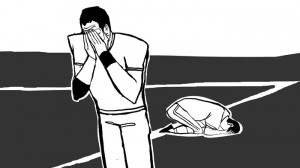Competitive arena needs room for emotion
It’s been popular to hate the Miami Heat this year.
The championship parade before they even played a game and their early season struggles made them easy targets for critics from the beginning.
So when Heat players cried in the locker room after a regular season loss to the Chicago Bulls on Sunday, fans and other players were quick to jump on the bandwagon.
But rather than trying to emasculate these players, fans should appreciate the Heat’s competitive spirit in a world where sports is dominated by apathy and money.
Fans value players who pride themselves on winning — it’s why Kobe Bryant is the most popular player on the Lakers.
In the NBA, you rarely see a group become emotional about a win or loss.
But the Heat have not proven themselves against most of the top teams in the league, and after suffering another close defeat, they were understandably emotional.
Maybe coach Erik Spoelstra shouldn’t have revealed that players were crying, but fans shouldn’t be quick to criticize Heat players for that emotion. It at least shows they were giving maximum effort — something many players can’t say about themselves.
Miami is a team unlike most others in the NBA. Most of the players were not just lumped together as draft picks or random free agent signings.
These players chose to play together in Miami, and therefore have a collective interest in winning together. They need to win because the stakes they created for themselves are much higher.
They weren’t crying Sunday because they lost. They were crying because they have been collectively failing to achieve the goals they had for the regular season.
LeBron James and Dwayne Wade haven’t played off of each other’s energy to the degree they hoped they would, and that discord has hurt the team, especially in the closing minutes of games, when one player usually takes over.
Both superstars have been afraid to assert themselves, and the harsh reality of their apparently ideal situation is kicking in.
They might not have been the ones crying, but their failures are part of the reason players cried in the first place.
The players’ emotion was caused by frustration and competitive fire; that emotion is a great byproduct of sports on the rare occasion it is displayed.
Tiger Woods, Michael Jordan and Tim Tebow have become famous for crying after huge wins, and they are celebrated for it.
Yet, when the Heat cry, they are deemed immature and mentally weak.
The media sensationalized a story that really had no place in the national news.
There is no reason for crying to be unacceptable. Yes, the NBA (as deemed by retired player and notorious enforcer Charles Oakley) is a “grown man’s game.”
But crying because you lost doesn’t make you any less of a man. Emotion does not equate to weakness — this is a concept the media has failed to understand.
Hopefully, fans around the nation will not succumb to the same judgement the media makes of our athletes.
The Heat’s early celebration before the season may have been overdone. But when it comes to the game itself, athletes are out there — on the court, field or arena — to do their job. And we can only hope that our athletes, whom gain our attention on a daily basis, are passionate about their jobs. Otherwise, there
It’s not that there should necessarily be more crying in sports — it’s more that there is a place for it. Those who say otherwise are taking a near-sighted and generally shallow view of the place of emotion in sports.
Cyrus Behzadi is a freshman majoring in communication. His column, “The Extra Point,” runs Wednesdays.

